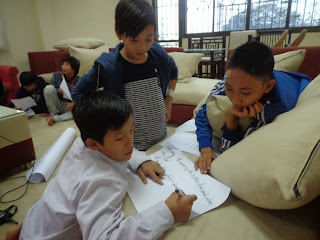Here's a snapshot...
- 162 street and homeless children received help from the Street Outreach team.
- 56 street children were reunited with their families.
- 19 rescue trips brought home a total of 82 victims of human trafficking from brothels and factories.
- 20 human traffickers arrested, and 10 sweatshops penalised for using child labour.
- 4 victims of sex trafficking represented in court.
- 836 children and family members received legal registration papers, such as birth certificates and identification cards.
- 715 children and families received legal advice.
- 20 children and youth in conflict with the law received legal advocacy.
- 1205 children went to school, with full support for school fees, uniforms and study gear.
- 53 teens studied at Vocational Training centres.
- 76 tertiary students received scholarships and support.
- 83 kids taken to a doctor or hospital.
- 112 children received a bicycle to go to school.
- 50 life skills workshops were held for children and family members.
- 31 victims of child sexual abuse received legal advocacy and emergency care.
- 104 children stayed in Blue Dragon's short term accommodation.
- 112 children and and teens lived in Blue Dragon's long term accommodation.
- 36,080 meals served to hungry kids.
- 8,160 kg of rice distributed.
- 183 games of soccer played.
- ... and our work all around central and northern Vietnam meant that the trusty Blue Dragon car drove a total of 41,199km!
P.S. We're not sure how to measure fun, but we had loads of that, too!!
- 162 street and homeless children received help from the Street Outreach team.
- 56 street children were reunited with their families.
- 19 rescue trips brought home a total of 82 victims of human trafficking from brothels and factories.
Children trafficked for work in garment factories: April 2013
- 20 human traffickers arrested, and 10 sweatshops penalised for using child labour.
A sex trafficker is taken into custody: March 2013.
- 4 victims of sex trafficking represented in court.
- 836 children and family members received legal registration papers, such as birth certificates and identification cards.
A Thai woman in northern Vietnam with her legal documents: December 2013.
- 715 children and families received legal advice.
- 20 children and youth in conflict with the law received legal advocacy.
- 1205 children went to school, with full support for school fees, uniforms and study gear.
- 53 teens studied at Vocational Training centres.
- 76 tertiary students received scholarships and support.
Tertiary scholars gather to plan their year: October 2013
- 5 houses built. - 83 kids taken to a doctor or hospital.
- 112 children received a bicycle to go to school.
- 50 life skills workshops were held for children and family members.
A workshop on Keeping Safe: November 2013.
- 31 victims of child sexual abuse received legal advocacy and emergency care.
- 104 children stayed in Blue Dragon's short term accommodation.
- 112 children and and teens lived in Blue Dragon's long term accommodation.
- 36,080 meals served to hungry kids.
- 8,160 kg of rice distributed.
- 183 games of soccer played.
- ... and our work all around central and northern Vietnam meant that the trusty Blue Dragon car drove a total of 41,199km!
P.S. We're not sure how to measure fun, but we had loads of that, too!!
A performer from Circa teaches the kids some tricks: November 2013.
























